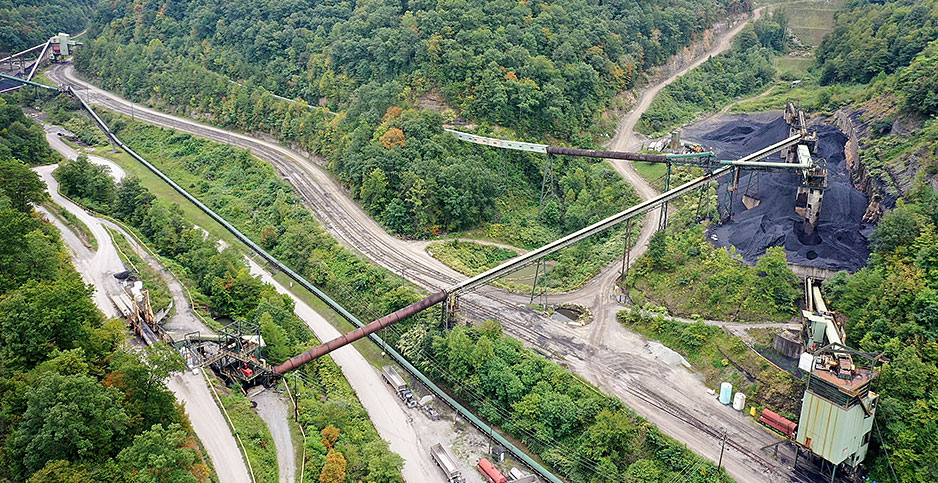
 






.gif)



|
Signature Sponsor


June 2, 2021 - President Biden has made the cleanup and restoration of abandoned mines a cornerstone of his effort to reinvigorate the economies of coal communities, earning praise from advocates of a fair transition away from fossil fuels. But while Biden has big ambitions to tackle mine reclamation, he hasn't yet nominated a director of the cleanup agency, the Interior Department's Office of Surface Mining Reclamation and Enforcement. "Right now, we just really need a leader at OSMRE," said Shannon Anderson, attorney at the Powder River Basin Resource Council, a landowner advocacy group based in Wyoming.
Coal being mined in 2019 from a mountainside at a strip operation near Pikeville, Ky. Like other states, Kentucky has experienced the closure of many mines over the past few years, creating reclamation headaches for state and federal regulators. Photo: Scott Olson, Getty Images "We need somebody who's going to take the bull by the horns, so to speak, and really get a handle on abandoned mine land issues and the opportunities this administration wants to put forward." Between Biden's infrastructure plan and his preliminary budget outline, the White House has proposed spending nearly $17 billion on abandoned mines and orphaned oil and gas wells. Biden's full budget proposal released last week would see OSMRE receive a $50 million bump for its grant program to create economic activity on former mine lands, such as converting them into commercial spaces or outdoor recreation opportunities (Greenwire, May 28). Activists say these measures could help bridge the gap for workers hurt by coal's downturn and assist whole communities dealing with the industry's legacy of degraded land and dirty water. But it is a big task at a pivotal point. Although the White House has created an interagency working group to focus on the needs of coal communities — and appointed Brian Anderson, an Energy Department official, to spearhead it — advocates say strong leadership at OSMRE also will be crucial (Energywire, April 23). OSMRE is charged with regulating an industry in its twilight. Demand for coal in the power sector has been declining for a decade with no prospect of long-term recovery. The office oversees the cleanup of historically abandoned mines and tries to hold coal companies responsible for reclaiming their current operations. President Trump's OSMRE director was former Ohio regulator Lanny Erdos, who led the agency in an acting capacity until the Senate confirmed him the month before Biden's inauguration. Erdos made his mark on OSMRE by easing federal oversight of states' investigations into mine violations and relaxing a standard for how to return mine land to its natural state (Greenwire, July 17, 2020). Erdos couldn't be reached for comment about his perspective on OSMRE's challenges during the Biden administration. Peter Morgan, a Sierra Club attorney who focuses on coal mining, said OSMRE's top priority should be shoring up financial assurances to prevent a new wave of mass mine abandonment. "OSMRE needs to understand the coal mining industry is never going to have more assets than it does at this moment. OSMRE needs to ensure that the max amount of resources are put towards meeting reclamation obligations," he said. 'Not designed for the end of the industry'
The agency carries out the Surface Mining Control and Reclamation Act of 1977 (SMCRA), which gives states and coal operators financial avenues for ensuring mine land is restored after a mine has been tapped out. The requirements that states impose on companies include mandating the purchase of surety bonds from insurance companies and participating in bond pools. Many states that don't require full-cost sureties maintain bond pools to make up the difference. Each coal operator in a state contributes fees to its fund. The idea is if one or two small companies in the pool fail, the collective can compensate. In a financially sound sector, this system could work well. But in a distressed industry, it's a recipe for disaster, Morgan said. Tom Clarke is executive director of the Interstate Mining Compact Commission, an advocacy group for state mining regulators. He said it's possible for alternative bonding systems like bond pools to secure mine cleanup. "If it's done according to the requirements of the law, it should provide an adequate amount of money for assurance of reclamation. The question is whether you keep up with current circumstances," Clarke said. Blackjewel LLC, once the sixth-leading U.S. coal producer, abandoned 33 mining permits in Kentucky in March. The failure of such a major company in the state's bond pool could cripple its ability to clean up after other potential mine permit forfeitures (Greenwire, March 22). Mary Cromer, deputy director of the Appalachian Citizens' Law Center, said the federal coal mining law didn't foresee some of the problems arising during coal's downward spiral. "SMCRA was just not designed for the end of the industry," Cromer said. She and Morgan worry Blackjewel's bankruptcy could foreshadow more mine abandonments. Functionally abandoned mines are littered across Appalachia. Operators have idled them while they hold out for a reversal in coal's fortunes in energy markets, the two attorneys said. The scope of the problem is also unclear. Cromer and Morgan urged OSMRE to create an inventory of functionally abandoned mines as the first step in preventing financially troubled companies from permanently walking away from their reclamation obligations. "If the market doesn't improve, it's just a matter of time until there is a whole string of Blackjewels," Cromer said. The issue of mines that sit idled for years with little chance of reopening underlines the importance of SMCRA's contemporaneous reclamation requirement, Morgan said. Mine operators are supposed to actively restore land while extracting coal from other parts of the mine. Morgan said OSMRE should more strictly enforce that mandate. UnderstaffedJoe Pizarchik, who led OSMRE in the Obama administration, said the bureau has practical problems to solve first. "They do not have adequate staff to fulfill the statutory requirements established by SMCRA," he said. Forty-six of 435 positions on OSMRE's employee directory are labeled "vacant," although sources say the list is outdated.
Pizarchik, who said he wouldn't rule out a return to OSMRE, has been a vocal advocate for renewing the bureau's abandoned mine land program since leaving his post in 2017 (Greenwire, April 14). Authorization of the fee that mine operators pay into Interior's AML fund expires in September. Environmental groups and the coal industry agree Congress should reauthorize it but have not reached consensus on the fee levels and oversight of the fund (E&E Daily, March 19). The National Mining Association has advocated for renewing the AML program at lower fee levels. The industry group, which declined to comment for this story, generally supports state agencies as the primary regulators of coal mining. Renewing the AML fee is also among the top priorities for IMCC, the state regulators group. IMCC advocates for a "cooperative federalism" approach to OSMRE's relationship with states. The federal coal mining law allows states to take primary responsibility for mine permitting, with OSMRE in an oversight role. As a last resort, OSMRE can take the rare step of taking over a program if a state violates that law. The framework creates a dynamic where states try to pull responsibilities away from OSMRE, environmental advocates say. Erdos, Trump's OSMRE director, also espoused a cooperative federalism philosophy. He cited it last year in his rulemaking decision to restrict use of 10-day notices, a key enforcement tool. OSMRE used to issue 10-day notices to states when citizens brought credible complaints regarding environmental or safety hazards like a mine polluting a neighbor's well. States would have 10 days to investigate and respond once OSMRE issued a notice. The new rule dictates that OSMRE should communicate with state regulators more closely before resorting to 10-day notices. Environmental advocates worry the new process could discourage OSMRE from issuing notices at all and give the public less power to rein in pollution (Greenwire, May 13, 2020). In a memo to Biden's transition team, IMCC plead with the president to give the policy a shot. "It also ensures the citizens' complaints are first directed to the state regulatory authority for investigation and action, rather than becoming delayed as state and federal agencies engage in an exchange of paper that is nothing more than a regulatory tug of war," IMCC wrote. 'Time is not something the industry has'Interior's press office did not grant an E&E News request to interview OSMRE Deputy Director Glenda Owens about enforcement, bonding and other challenges the bureau faces. A spokesperson for the department emailed a statement by Laura Daniel-Davis, who oversees OSMRE in her capacity as Interior's principal deputy assistant secretary for land and minerals management. OSMRE will play an important role in "building back better," Daniel-Davis said. The White House did not respond to a request for a status update on its search for an OSMRE director. Anderson, the Powder River Basin Resource Council attorney, said that while much of the attention on coal mine regulation and potential abandonment has focused on Appalachia, OSMRE also has pressing issues to address in the West. In Montana and Wyoming's Powder River Basin, 16 mines produce about 40% of the country's coal. One of these behemoths closed this year, while two others have begun winding down operations as demand for thermal coal dries up. Coal production in the basin has been cut by half since 2010 (Greenwire, May 19). Anderson said OSMRE will have to ensure mine operators complete the complex processes of restoring grassland ecosystems, sagebrush and aquifers. She fears that reclamation in the basin could be inadequate and rushed without proper oversight. "That takes time, and frankly, time is not something the industry has," Anderson said. |
 











|
